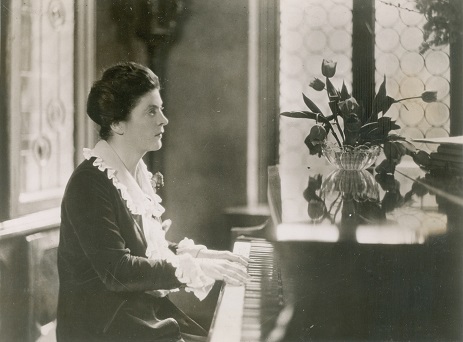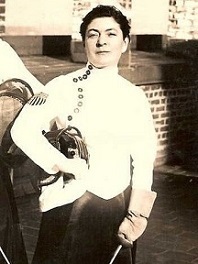| Home |

| Photo of the Month September 2025 |
| See Previous Photos Unknown Faces and Places |
 |
||||||
|
Born in 1890 in Galesburg, IL, she was the daughter of Judge James R. and Ettie (Stephens) Prichard of the family of David and Margaret (Darling) Welker. Irma graduated from high school at age 14 and from St. Mary's College in Knoxville, IL at age 17. In her youth, Irma learned how to write songs, was trained to sing and perform on stage and became an accomplished pianist. As such, she attracted the eye of a professor of the Chicago Musical College, who gave her "a free scholarship and instruction under his own supervision," reported the Rock Island Argus, "believing that she had a promising future."
|
Olympic fencer Irma Courtesy Marcia Stephens |
The widowed Irma did not let her personal loss keep her ambition suppressed. She received a diploma in 1917 from the American Academy of Dramatic Arts and then during World War I she joined the Women's Motor Corps and was considered one of the corps' "crack marksmen." In the years after the war, her songs were performed by such stars as Nora Bayes, Yvette Guilbert and Fannie Brice (whose life story was played by Barbra Streisand in the 1968 film Funny Girl). During the 1920s, Irma penned the music and lyrics for a number of popular songs, among them "I'm in Love with a Maid" -- "The Days of Long Ago" -- "Just Try and Weather the Storm" -- "A Warning" -- "Just Like a Violin" -- "Just Around the Corner" -- and many more.
After the death of famed opera star Enrico Caruso in 1921, Irma is known to have accompanied the bereaved widow Dorothy to Italy to help settle the estate. Accounts of the trip were published in a weekly periodical some years later in 1928. Said the Bureau County Tribune, "Mme Caruso, widow of the great tenor, was so struck with her voice that she introduced her to Madame Tetrazzini in Naples and the diva in turn was stirred to such enthusiasm that she offered to supervise Mrs. Hopper's training and to ensure her debut in Rome, but events compelled the young artist to return to America."
Irma took up fencing in about 1921 and quickly mastered the sport, winning the 1924 National Woman's Fencing Championship. As such, she joined the U.S. Olympics team and competed in foil competition in the Summer Games of 1924 (Paris) and 1928 (Amsterdam). During the Amsterdam Games, she was bested by 17-year-old Helene Mayer of Germany.
Her fortunes turned in 1939-1940 when she and others were convicted of conspiracy connected with the fraudulent sale of lottery tickets benefiting the Carrie Tingley Hospital for Crippled Children at Hot Springs, NM. She was sentenced to a year and one day behind bars. Later, Irma made a residence in relative obscurity in the 1940s, '50s and '60s in New York City. She died in 1963.
|
Copyright © 2025 Mark A. Miner |


